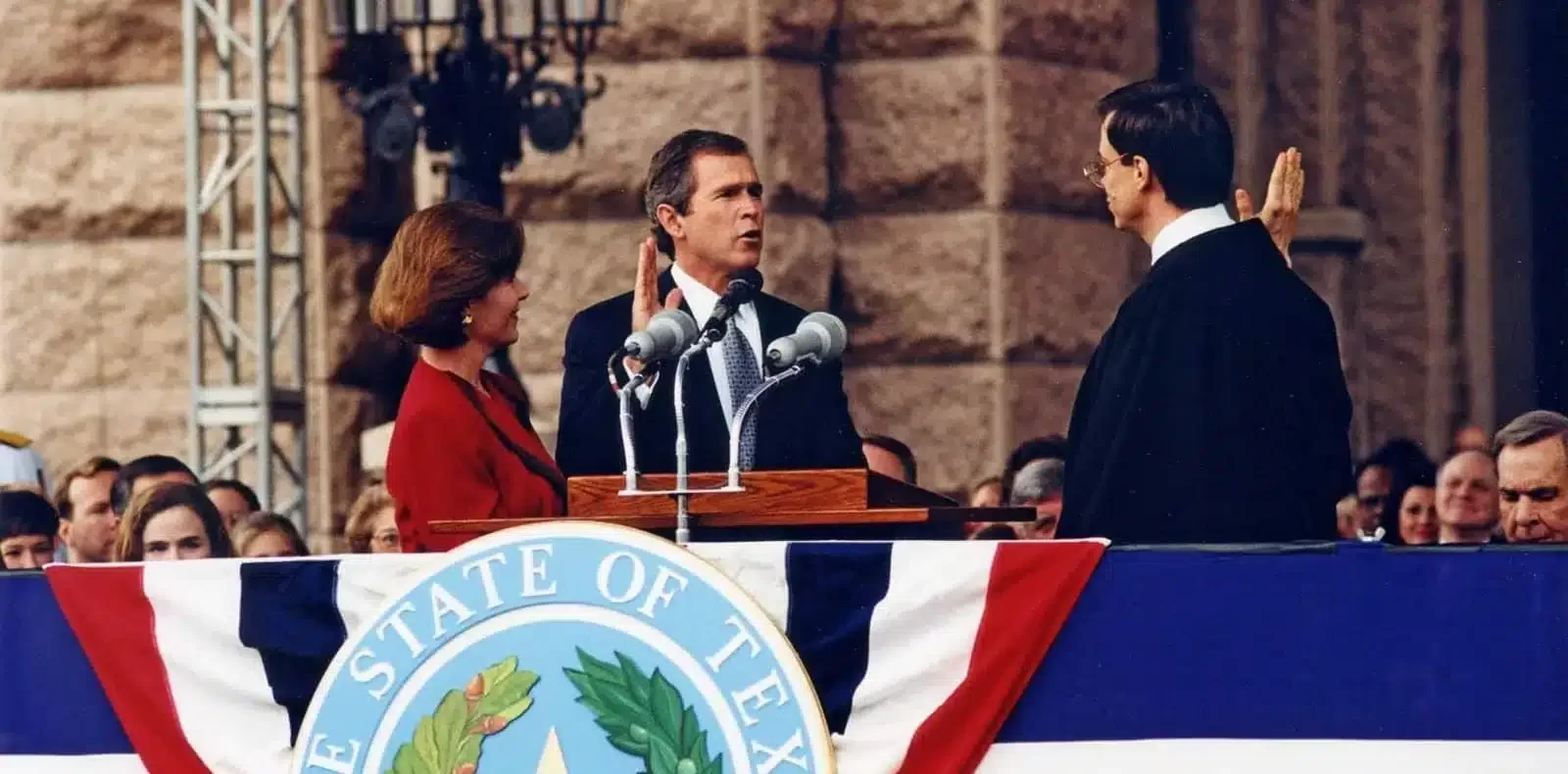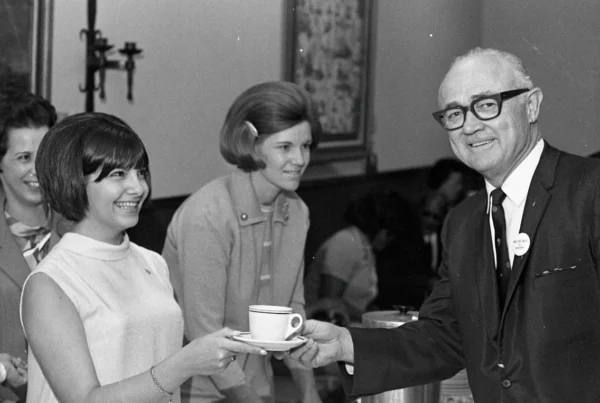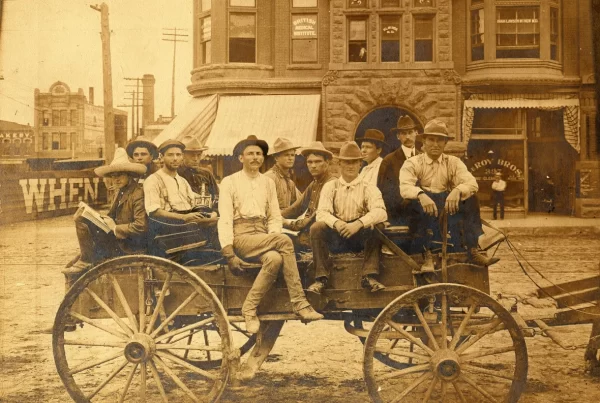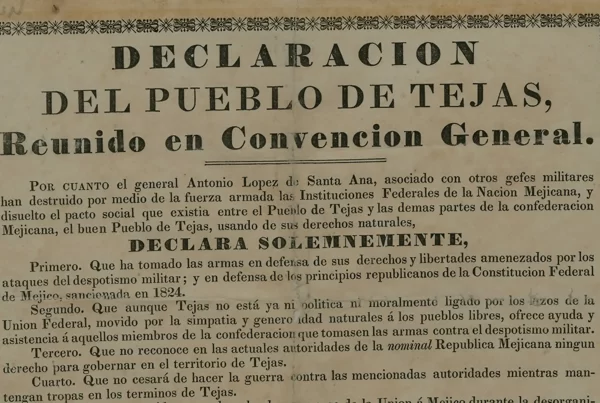Before becoming president, George W. Bush served for six years as governor of Texas, winning election twice, in 1994 and again in 1999. At his first gubernatorial inauguration on January 17, 1995, Bush outlined his ideological commitments and declared, “I feel the wind at our backs. My enthusiasm for our mission is exceeded only by my confidence that we can succeed.”
The line captured the optimistic tone of his new administration — and, in hindsight, foretold both the economic boom that Texas would soon experience and the political momentum that would carry Bush from the governor’s mansion to the White House just six years later.
Bush’s election in 1994 marked the beginning of more than 30 years of Republican dominance in Texas and the end of Democratic control in Texas statewide politics. Yet his governorship was also a transitional era, during which centrist and conservative Democrats were still influential in the Texas Legislature — including House Speaker Pete Laney and Lieutenant Governor Bob Bullock, who presided over the senate.
In his inaugural address, Bush paid respects to his defeated Democratic rival, Governor Ann Richards, and expressed a desire for cooperation with the Democrat legislative leaders: “I am eager to work with you, Governor Bullock and Speaker Laney.” Both men went on to work closely and productively with Bush. Bullock even made headlines by endorsing Bush’s re-election bid in 1998.
In retrospect, the Bush era appears relatively bipartisan in retrospect, especially compared to the hyper-partisan environment that emerged in the 2010s and 2020s. This experience of cross-party cooperation, though derided or downplayed by critics, proved important in the 2000 presidential campaign, when Bush portrayed himself as a “uniter, not a divider,” citing his gubernatorial experience as proof that he could govern across party lines and change the tone in Washington.
Bush’s 1995 inaugural speech is a key document in understanding Bush’s political philosophy and background before the presidency. It reflects a moment when the Republican Party was consolidating power, yet still striking a tone of inclusion.
Inaugural Address of Governor George W. Bush
January 17, 1995
Fellow Texans, Governor Bullock, Speaker Laney, my beloved family, and many friends — thank you all for coming. In this wonderful crowd, there are many special guests. I would like to especially recognize five: they are the governors of the Mexican states closest to Texas.1 Will you please help me welcome them? Their presence is a clear sign of the importance of the relationship between Texas and Mexico. Friends bring out the best in each other. May our friendship bring much good to both our countries.
I stand where others have stood before, in front of this magnificent Capitol. Moments ago, my hand was on Sam Houston’s own Bible — simple and worn — that has consecrated the oath-taking of many other Texas governors.2
Once again, all Texas witnesses the special moment when the people transfer the solemn responsibilities of the office of governor from one person to another.
My predecessor served our state well. The example she set gives heart to those who battle adversity and hope to those who wonder if opportunity is limited. Today, as Governor Richards leaves office, Texas owes her a debt of gratitude.3
After the storm of the campaign, the transfer of authority from one governor to another happens in relative calm; so much so, that we run the risk of taking this special moment for granted. We must not. Our republican form of government only endures because Texans will its continued existence.
Though other Texas governors lived in much different times, faced different challenges, and spoke in their own way upon this platform on their Inaugural days, certain things are unchanged.
I share the sense of dedication that other new governors must have felt. Like them, I understand that I am responsible to all the people of Texas.
I share the excitement of those who have come to this job before me — their sense of purpose, and their eagerness to get on with the task ahead.
I share my predecessors’ feelings of humility. The duties that I assume can best be met with the guidance of One greater than ourselves. I ask for God’s help.
I share my predecessors’ knowledge that progress is only possible with cooperation with the lieutenant governor, the speaker, and the legislative bodies they represent. I am eager to work with you, Governor Bullock and Speaker Laney. Our task is to serve the great people of Texas — to serve them well, and constantly, and unstintingly. Together, we will do that.
I share the energy of one newly scrutinized by Texas. During the campaign, I sought to let people know what was in my heart by speaking plainly and simply about my vision for our state’s future. It was that philosophy and vision which were endorsed in November.
After traveling our state seeking the vote, I have seen what those who held this office before me knew. Texas is a mighty land, full of loving and caring people. Texans dream big dreams and achieve those dreams when freed to do so.
As governor, I will call upon the best within every Texan as we confront our challenges, great tasks, and important missions. Among the most important of these is restoring government to its proper role. A few moments ago, when I took the oath of office, I pledged to defend two Constitutions, those of the United States and of Texas. You expect me to honor that oath — and I will. You expect me to heed the principles of those documents — and I will.
As your governor, I will start by defending our forefathers’ intelligence in defining separate roles for our federal and state governments. That wisdom was expressed in the Bill of Rights’ 10th Amendment, which gives to the states all powers not specifically granted to the federal government.4 The spirit of that Amendment has been forgotten in recent decades. I pledge to you: it will be forgotten no more.
As governor, I will use every resource at my disposal to make the federal government in Washington heed this simple truth: Texans can run Texas. As we ask Washington to return to Texas the power to innovate, to set our own course, to direct our own lives, we must also be consistent at home. If we trust Texans to make the best decisions for Texas — and we do — we must also trust Texans to make the best decisions for their local schools and local communities. My guiding principle will be: government if necessary, but not necessarily government.5
By trusting Texans, the state is more likely to focus on its principal responsibilities: good and safe streets, excellent schools, help for those who cannot help themselves, and respect for private property.
By trusting Texans, we free them to succeed. I recognize that by doing so, we run the risk that sometimes, some of them will fail. But mistakes made closest to the people are those most easily corrected.
I also recognize freedom without responsibility is simply license. For the last thirty years, our culture has steadily replaced personal responsibility with collective guilt. This must end. The new freedom Texas seeks must be matched with renewed personal responsibility. The very future of our society depends on it.6
Responsibility starts at home. It starts with responsible families. I wish I knew the law that would cause people to love each other. I do not. But I do know our laws must be written to strengthen families — not diminish them. Every piece of legislation that crosses my desk will be judged by whether it keeps families together, safe, and strong.
If we are to save a generation of young people, our juvenile and criminal laws must hold people responsible for what they do. Discipline and love go hand in hand. If we want young Texans to learn to make correct choices, the consequences of bad behavior must be certain and clear.
If we are to end dependency on government, we must change the welfare system. Often, the present system diminishes personal responsibility and rewards illegitimacy.7 For too many of the able-bodied, it says you cannot succeed. This is not the Texas way.
If we are to prepare our children for their exciting future, our education laws must place the power over our schools in the hands of our local communities and citizens. We must empower teachers, administrators, school boards, and parents to design the schools that best fit their community’s needs. Texas must set high standards for our schools, free local districts to innovate, and hold educators responsible for results.
Texans understand governors and government do not create prosperity. Producers, inventors, and entrepreneurs do. What government does is create an environment in which people are willing to take economic risks that create jobs. There are many ways for a business to fail. We must not allow one of them to be a frivolous lawsuit. So that every small business person in Texas has a better chance to succeed, Texas must end the junk lawsuits that clog our courts and threaten our producers.8 Doing so will expand our job base so anyone who wants a job can find one.
Texas is ready for government that works. Texans know the more government tries to do, the less it accomplishes. Texans want government to concentrate on a few critical areas and do them well. Most of all, Texans desire for ourselves and coming generations the liberty to dare, to risk, and to succeed. This is our mission. It is clear and bold. We must make Texas a beacon state. It is within the power of every Texan, working together, to mold a bright future. I ask for your help, your commitment, and your prayers for the work ahead.
I feel the wind at our backs. My enthusiasm for our mission is exceeded only by my confidence that we can succeed. And when we do, those who feel left behind will have new hope, those who have grown cynical will begin to care, and our children will grow up in a more prosperous and more peaceful state. The history of our special land tells us this: that what Texans can dream, Texans can do. To be your governor is an unimaginable honor. Thank you for your confidence in me, and God bless Texas.
Explanatory Notes
- Texas shares its southern border with four Mexican states: Chihuahua, Coahuila, Nuevo León, and Tamaulipas. Governors from these states — especially Nuevo León and Tamaulipas — are frequently invited to Texas gubernatorial inaugurations as a diplomatic gesture reflecting close economic, cultural, and security ties. ↩︎
- Sam Houston served as the first elected president of the Republic of Texas and later as governor, after Texas’s annexation by the U.S. ↩︎
- Ann Richards, a Democrat, was the 45th governor of Texas (1991–1995) and known nationally for her sharp wit and progressive views. The 1994 race between Richards and Bush was closely watched and occasionally contentious. Bush’s acknowledgment of her service here can be read as a conciliatory gesture — a customary but meaningful moment of respect toward a political opponent after a hard-fought election. ↩︎
- Texas state leaders, including the Republicans of the 1990s, frequently have invoked the 10th Amendment to emphasize state sovereignty and push back against perceived federal overreach—especially on issues like education, welfare, and regulation. ↩︎
- This phrase echoes a paraphrase of William Lyon Mackenzie King’s famous line about war: “Conscription if necessary, but not necessarily conscription.” Bush uses it here indicate a preparedness to use government power, but a preference to avoid it if possible. ↩︎
- This line reflects a central theme in 1990s conservative thought — that individual liberty must be balanced by moral and civic responsibility. President Reagan emphasized this theme, as did Bush’s father, George H. W. Bush, who promoted a vision of “a thousand points of light” — encouraging individual citizens and communities, not government, to lead through service and responsibility. ↩︎
- In the 1990s, welfare reform debates often focused on concerns about out-of-wedlock births and long-term dependency. Bush’s rhetoric here foreshadows national reforms passed in 1996 under President Clinton, which introduced work requirements, time limits on benefits, and incentives for states to reduce nonmarital births. These policies did not bar single mothers from receiving aid but aimed to promote work, personal responsibility, and family stability—goals shared across much of the political spectrum at the time. ↩︎
- This refers to tort reform — limiting lawsuits and damages in civil litigation — a major Republican priority in Texas and nationally during the 1990s. The “junk lawsuits” Bush mentions typically refer to personal injury claims seen as frivolous or excessive, such as product liability, medical malpractice, or slip-and-fall suits, which business groups argued discouraged investment and job creation. ↩︎
This article is part of Texapedia’s curated primary source collection, which makes accessible both famous and forgotten historical records. Each source is presented with historical context and manuscript information. This collection is freely available for classroom use, research, and general public interest.



